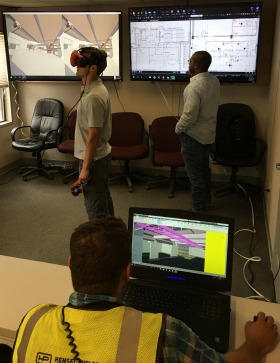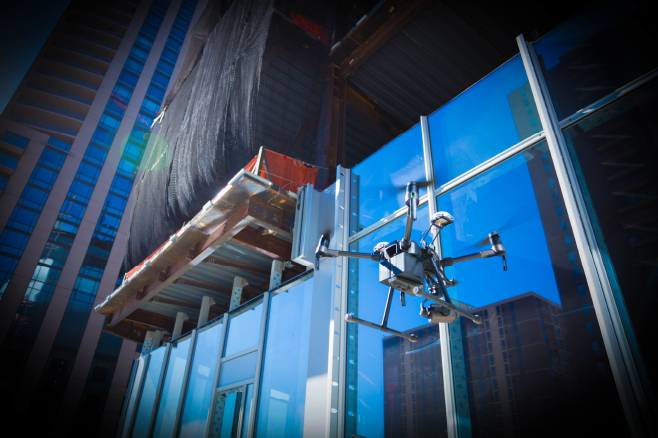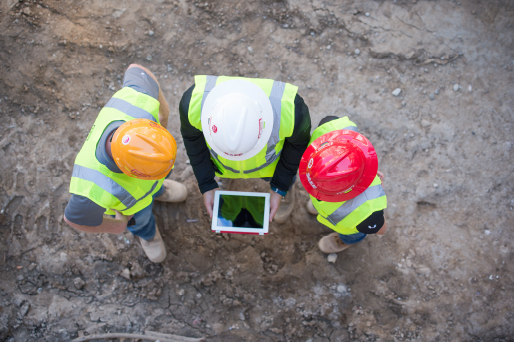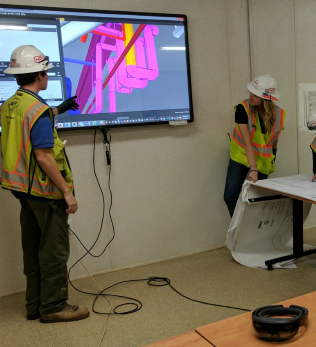
Discover The Trades
If you are interested in working with the latest technology in a dynamic industry, a career in construction might be for you!
The construction industry is changing with the times and is exploding with new technology innovations including:
Augmented reality is similar to virtual reality, but allows the user to maintain interaction with the real environment. AR combines real world physical surroundings with computer-generated data through advanced software, camera and sensor technology. Examples of augmented reality used in construction include the Daqri helmet, providing workers with real-time data about the construction site/environment and provides data such as animated instructions while completing a task. Other specialized glasses/goggles or mobile devices are also used for AR technology.
BIM refers to a 3D digital modeling process via software and other tools that gives everyone involved in a project all the information needed from design, construction, and building maintenance.
Project managers, architects, and owners are benefitting from cutting edge business intelligence software for construction to improve project safety, efficiency, budgets, and timelines.
Cloud-based collaboration is utilized in the construction industry to eliminate gaps in information between the office and job site, including estimating and design, improving communication and productivity on any project.
Drones have become a valuable resource for the construction industry in recent years. They are mainly used for land surveying and building inspections, job site monitoring and security, and provide visual material for contractors and clients, plus mapping data.
Green or eco-friendly buildings, construction techniques, and materials have a significant impact on our environment. Green materials yield low energy costs, high durability, have low maintenance requirements, and many contain a large proportion of recycled or recyclable materials. Some of the most efficient green construction materials include: recycled steel, precast concrete, bamboo, sheep’s wool, straw bales, earth, and plant-based polyurethane rigid foam.
In construction, predictive analytics describes a variety of statistical techniques from data mining, predictive modeling, and machine learning. Advancements in predictive analysis software improves project estimating, risk analysis, technical and structural data accuracy, and safety.
Prefabricated construction is the assembly of components of a structure at a controlled manufacturing site, then transporting those components to the location of the actual construction job site. Prefabrication is becoming more common, with advancements in technology and quality. Benefits of prefabrication include cost savings and time, consistency, safety, flexibility, and reduced disruption at the job site.
Robotics have primarily been utilized in fabrication of building construction machinery, arc welding metal components, applying adhesives, and assembling doors and windows. New advancements in robotics include 3D printing robotic arms, masonry and brick-laying robots, robots used in road or bridge construction, and demolition robots.
Virtual reality technology for the construction industry has made huge advancements in recent years to save time and money. VR allows the contractor or client to be fully immersed in or walk-through a virtual space. In conjunction with 3D-modeling software, VR technology eliminates the need for less accurate, time consuming physical drawings or architectural models. An interactive virtual 3D model of the project can be digitally updated as the project moves along with a high degree of accuracy.
Wearable technology for the construction industry is used to improve safety and productivity. Wearable devices and clothing can track employees and equipment, and improves comfort, especially for workers that have mobility issues.
3D printing technologies are being used more and more in today’s construction world to fabricate housing, construction components, bridges and civil infrastructure, and more. Benefits include faster construction, lower labor costs, increased accuracy, and less waste produced.




